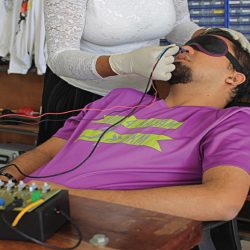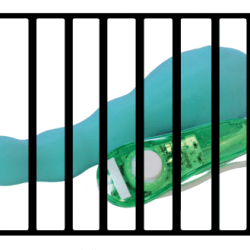Star Trek and the Future of Sex: Birth Control and Alien Pregnancy
Birth control in Gene Roddenberry’s vision of the future.

In part one of our look at how Star Trek has explored the sexual issues of the present—and projected with optimism how humanity may, someday, evolve to where it can embrace them with intelligence and sensitivity—we looked at how the franchise has addressed sexual orientation. First by the current controversy about Sulu’s coming out in Star Trek Beyond and then in episodes from Star Trek: The Next Generation and Star Trek: Deep Space Nine.
Next, up, we’ll be seeing now Trek has handled an extremely sensitive topic—today and when the series first began in 1966: birth control.
“And the great misery which you now face”
Back when the original Star Trek was in production (1966 to 1969), it was the midst of the sexual revolution, a key part of which involved the (combined oral contraceptive) pill as well as concerns about overpopulation.
Even the networks were watching very carefully what Roddenberry was up to with his show. However, he still managed to produce a powerful statement on the importance of intelligently and thoughtfully looking at the issue.
In the Star Trek: The Original Series episode “The Mark of Gideon,” written by George F. Slavin and Stanley Adams and directed by Jud Taylor, Captain Kirk (William Shatner) beams down to the planet Gideon, a candidate for admission into the Federation, and mysteriously finds himself back on the Enterprise—and completely alone.
Eventually, Kirk discovers that he is actually on a mockup of his ship—and that the leaders of Gideon are hiding a terrible secret: their world, by both a quirk of biology as well as some irresponsible decisions, is nightmarishly overpopulated. So desperate are they to try and control their numbers that they have kidnapped Kirk to use a dormant virus he carries to infect a young woman, Odona (Sharon Acker), and then use it as a plague against their people.
The message of the episode is as clear as it is chilling: rather than take a sensible approach to birth control, Gideon is willing to murder a percentage of its people.
As Hodin (David Hurst), their leader, explains to Kirk: “But, you see, the people of Gideon have always believed that life is sacred, that the love of life is the greatest gift. That is the one unshakable truth of Gideon, and this overwhelming love of life has developed our regenerative capacity and our great longevity.”
To which Kirk points out: “And the great misery which you now face.”
In the end, Kirk escapes and Doctor McCoy (DeForest Kelley) inoculates Odona, saving her life. But Kirk is caught in a dilemma: he must return her to her overpopulated hell of a planet—but if he does then she will carry out the Gideon plan for mass death.
In the end, Kirk has to accept the fact that he has very little choice—and the episode leaves with a cautionary bite: that caring for life also means being intelligent about controlling it.
“One of the first things a diplomat learns is not to stick his fingers where they don’t belong.”
The issue of being responsible in regards to sexuality appears some years later in an episode of Star Trek: Enterprise—though, chronologically, the show takes place before the years of Star Trek: The Original Series.
The major concept of Enterprise was seeing the early days of Starfleet: when humanity was still trying to figure out how to understand, and interact with, alien species. Many episodes showed the crew of the prototype Enterprise stubbing their toes dealing with unique cultures and even more unique biologies.
In the episode “Unexpected”—written by Rick Berman and Brannon Braga, directed by Mike Vejar—one certain member of the Enterprise crew, Commander “Trip” Tucker (Connor Trinneer) stubs his entire body in a unique way during a visit to an alien vessel. While there, he becomes friendly with a member of the crew, Ah’len (Julianne Christie), and indulges in what he assumes to be a simple pastime involving a “bowl of pebbles.”
Back onboard the Enterprise, however, Trip begins to experience some odd medical quirks, leading the ship’s physician Phlox (John Billingsley) to perform an examination. His conclusion? Trip is pregnant.
There is, naturally, humor directed at the situation—a particularly funny comment coming from the Vulcan officer, T’Pol (Jolene Blalock) to Trip: “One of the first things a diplomat learns is not to stick his fingers where they don’t belong.”
But what’s interesting about the episode is that even though there is some soul-searching about the ramifications of the idea of Trip becoming a “mother,” he and the crew of the Enterprise work hard to find a sensitive and thoughtful solution—and find a way to pass the developing embryo to Ah’len .
This non-shameful attitude toward inadvertent pregnancy, as well as how the crew approaches the situation, is thoughtful and telling. There are no recriminations, no blame. Instead, there’s an acknowledgement that Trip, and humanity in general, just has to be extra careful about where they put any part of their bodies when making contact with other species.
Our next episode
Coming up in part three, “Star Trek and the Future of Sex: Stigma and the AIDS Epidemic,” is the examination of Trek’s handling of the responsibilities and risks of sex—sexually transmitted infections (STI)—in another episode of Star Trek: Enterprise.
Read part one: “Star Trek and the Future of Sex: Gay Characters and LGBT Love”
Read part three: “Star Trek and the Future of Sex: Stigma and the AIDS Epidemic”
Image source: Chris Pope
Leave a reply
You must be logged in to post a comment.

















